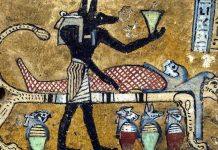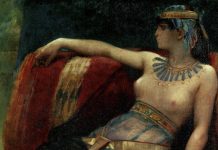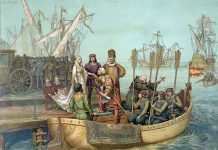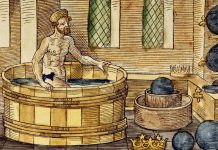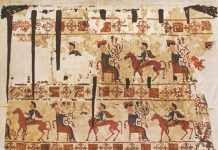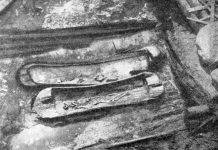Lorenzo de’ Medici – Italian poet, ruler of Florence was born on January 1, 1439.
… When the next pope was elected in Rome in 1471 under the name of Sixtus IV, no one thought that he would bring so many disasters to Italy, disturbing the unstable political balance of the Italian states. For the sake of his nephews, whom he bestowed with the highest ecclesiastical and secular positions, he was ready to ruin the whole world. Nothing could stop the pope in his quest to create a principality for his beloved nephew Girolamo Riario. Sixtus IV and his nephew inspired a plot by the Pazzi family of Florentine bankers against the Medici power.
A plan was worked out to kill both brothers – the rulers of Florence. On April 26, 1478, the church service was unexpectedly interrupted by a scream: Giuliano de’ Medici fell on the stone slabs of the temple, drenched in blood. The assassins rushed to Lorenzo de’ Medici, but he, retaining his courage, managed to defend himself and avoid death. So anxious and sad was the beginning of Lorenzo’s reign.
The Florentines supported the Medici supporters. The main participants in the conspiracy, including the Archbishop of Pisa and several priests, were hanged.
Florence had no time to recover from these bloody days, as Sixtus IV and the King of Naples, dissatisfied with the rule of the Medici, gathered their troops to attack the republic beyond their control, demanding the expulsion of Lorenzo de’ Medici.
But the republic decided to defend itself. On June 13, 1478, the Florentines formed a military commission of Ten, which included Lorenzo de’ Medici.
Lorenzo gathered the most famous citizens in the Palace and addressed them with a fiery speech.
300 people listened to Lorenzo excitedly, with tears in their eyes. And in recognition of the services of Lorenzo and the House of Medici to the Republic, Lorenzo heard the answer: “The Republic is grateful to him. All Florentines are for him.”
To negotiate joint military actions, the king sent his son, the Duke of Calabria, to Rome, who then led the Neapolitan troops that entered Tuscany. Florence, having no support from its allies – Milan and Venice – got into a difficult situation.
She was losing one position after another. In the Battle of Poggio Imperiale in September 1479, the troops of the Duke of Calabria inflicted a complete defeat on the Florentines. This forced Lorenzo de’ Medici to seek ways to reconciliation. In December 1479, he arrived in Naples, and for two months he negotiated peace with King Ferrante. The terms of the agreement were difficult for Florence, but the war was stopped. Alphonse of Aragon with an army settled in Siena as the owner and was not going to leave Tuscany.
Sixtus IV – lost, and directed his interest in a different direction. In April 1480, he entered into a separate alliance with Venice, which pursued the goal of dividing the territory of the Duchy of Ferrara. In response, Naples, Milan and Florence concluded an agreement against this alliance. Another internecine war was brewing.
But in July 1480, the Turks landed on the Italian coast and captured Otranto, turning it into a fortified point for further invasion into the interior of the country. Fright gripped the whole of Italy. The pope was forced to reconcile with the Florentines. Ferrante recalled the Duke of Calabria and his army from Tuscany.
Preparations for the fight against the Turks have begun. The threat was great, the weakness of the Italian states was obvious. But Sultan Mahmud II died suddenly in Constantinople. Taking advantage of this, Italian troops blocked Otranto and began its siege: in September 1481, the city was liberated.
King Ferrante proposed to Sixtus IV to use the papal fleet against the Turks in the Adriatic region. But the pope withdrew his ships from Otranto. Sixtus IV did not even think about further struggle with the Turks. He resumed his intrigues in Northern Italy, where Girolamo Riario, expanding his possessions, seized the city of Forli and, on behalf of the pope, negotiated in Venice about the division of the Ferrara territory.
In May 1482, Venetian troops moved to Ferrara, which was defended by Naples, Florence and Milan. In June of the same year, the troops of the Duke of Calabria appeared in Campagna, plundering and ravaging the environs of Rome, the Florentines operated in Umbria. The enemies of the pope were joined by representatives of the powerful family of Roman barons Colonna.
The situation of Sixtus IV was bad. The Venetian condottiero Roberto Malatesta, who came to Rome, came to his aid. Under his command, the papal troops in the battle of Campo Morto in August 1482 defeated the army of the Duke of Calabria, who escaped.
Dad’s plans have changed. Fearing the strengthening of the Venetians, he made peace with the king of Naples and allied with him against a recent ally.
Two years later, peace was concluded between the warring parties. Sixtus IV was so upset that he died the day after this news. Contemporaries said: “The ferocious Sixtus died after hearing the word “peace”.
The Florentine Republic was going through hard times. The war was a terrible burden on her shoulders. The firmness of the Florentines, the courage and bravery of the military commander and the subtle diplomacy of Lorenzo de’ Medici led Florence to conclude a treaty with the pope and the king. Peace has come.
Lorenzo surrounded Florence with fortresses and powerful fortifications. He considered the unity of the people to be the main goal of his policy. Lorenzo eloquently and thoroughly substantiating his arguments, spoke to the people. The decisions he made were always prudent. And in the implementation of the decisions adopted and supported by the people, he was quick and bold. Lorenzo was a gifted poet. The townspeople happily sang his songs about the heroes of ancient myths Bacchus and Ariadne, about nymphs in love and satyrs.





